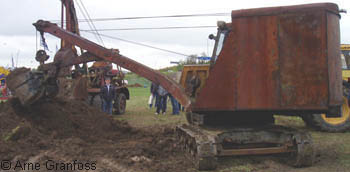To write about history

 UNDER CONSTRUCTION Version 0.21
UNDER CONSTRUCTION Version 0.21
|
Sweden in World War II - across borders
|
 |
It is not easy to write correct about history. Even though you have access to facts like formal documents, you may not have the full picture about the situation when the documents were written.
A book written during or shortly after the war may have limitations since the author had a more local view of the history, and maybe did not know about other related events. A book written later may be influenced by knowledge acquired later, which may alter the description of events.
There is also this chain: how was a message intended to be - how was it expressed - how was it interpreted and perceived at the time - how was it interpreted and perceived after some time when for example a book was written.
It may also be difficult to describe events and persons in the correct perspective and proportion, and not give the object or activity too high or too low importance.
How many books, articles and other documentations have been made about World War II? How many of them are based on earlier texts in books et cetera? Or on interviews with people who participated in the war in one way or another, and interviews with people who were not? How many misunderstandings and misinterpretations have been told on to other readers and listeners? How much have been kept correct over time, in both details and situation at the time?
One example is what happened in Oslo in Norway during the early April 1940. I find it very hard to understand why the Norwegian politicians and military didn’t react on the warnings communicated the week before the German attack on the 9 April. Even though there had been warnings about an imminent attack, the Norwegian officials were occupied during the 8 April with their protest against the mine fields the British navy had created in some areas along the Norwegian coast. That was a serious break against Norway’s declared neutrality. In the afternoon they received a report about the German ship “Rio de Janeiro” that was attacked by a British submarine along the south coast of Norway - and that rescued Germans told the Norwegians that they were on the way to Bergen to help protect Norway from attacks by British and French troops [s01]. The Norwegian government didn't react. But, there may have been many warnings over a longer period that had turned out to be false. Or had been considered to be false since nothing had happened.
To write about secret activities is harder in its nature, since secret activities were meant to be kept secret. The agents in the Norwegian intelligence organisation XU, with focus on military reconnaissance performed by Norwegian civilians, had made a vow not to reveal any of their activities. This vow wasn’t removed officially until in 1988, but agents continued to keep secrets.
Sometimes I will simplify, for example I use the word Sweden generally for Swedish government and other official departments and similar, as well as in general terms. Another example is the word Gestapo, which I use even if activities included other German and Danish/Finnish/Norwegian police and intelligence forces.
The given numbers of persons are not always exact. For example much was never recorded, and it was not unusual for people to use false names and nationalities in some circumstances. However the numbers give a picture about the size.
I will try to write short neutral balanced texts, without my own values.
2012-05-20. www.granfoss.se. Text/pictures: Arne Granfoss